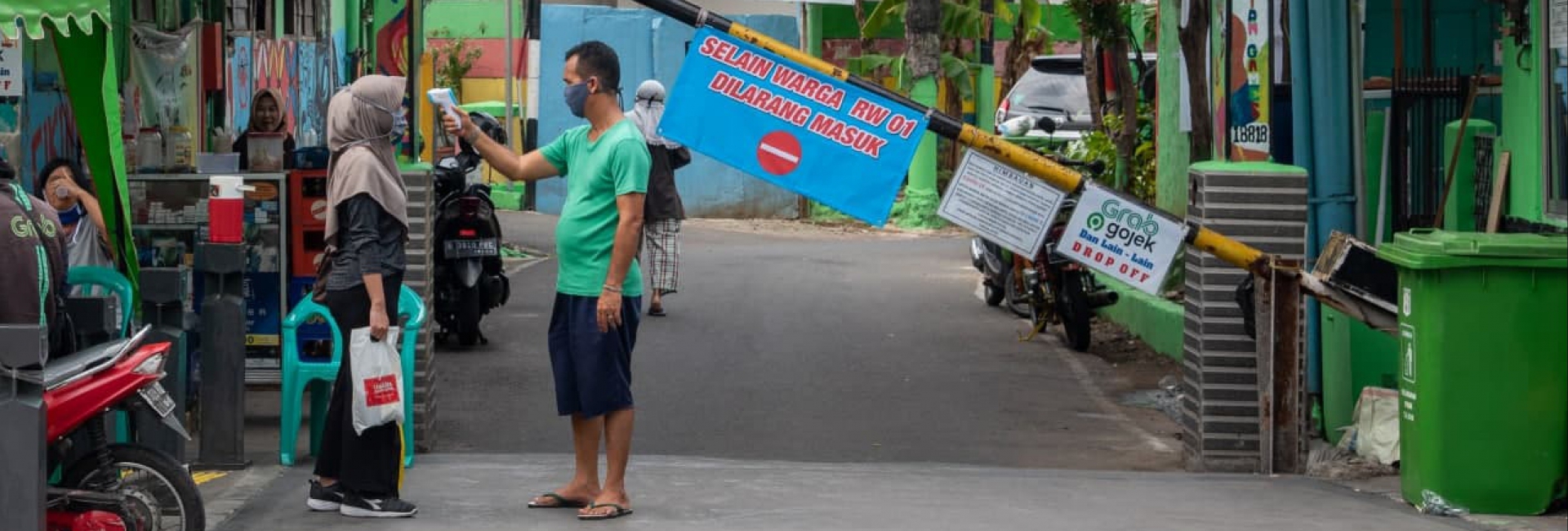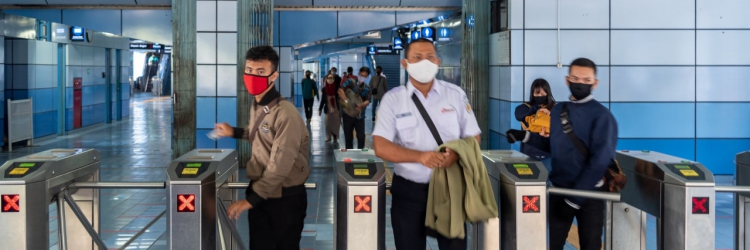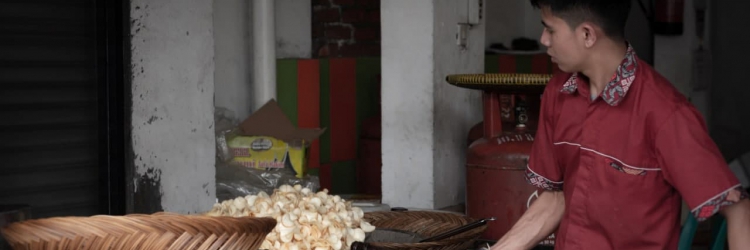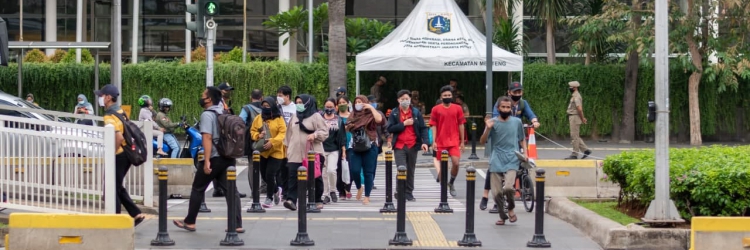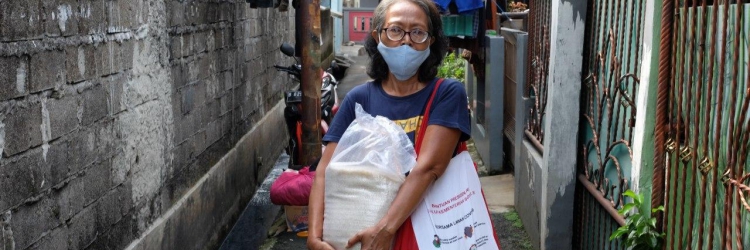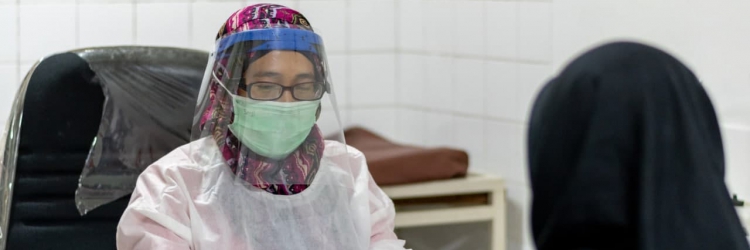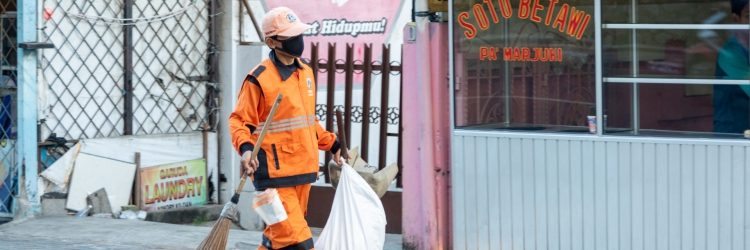Highlight:
Differences in people’s compliance with health protocols during the COVID-19 pandemic are caused not only by their diverse understanding of its risks but also by their job demands, financial capabilities, and other socio-cultural factors.
Since the first confirmed case of COVID-19 was announced by the Government of Indonesia on 2 March 2020, the disease has quickly spread across the nation. This situation raises concern from various parties and has forced people, both at individual and community levels, to adapt in various ways in order to slow down the spread of the virus.
Bani[i], one of the RT (neighborhood unit) heads in Kelurahan C, Jakarta Timur, whom SMERU interviewed in early May 2020, claimed that his neighborhood had implemented self-initiated social restrictions even before the large-scale social restrictions (PSBB) policy was introduced in DKI Jakarta Province.
‘“Even before PSBB was imposed, we had taken our [preventive] action. We have three entrances to our neighborhood. One is open for 24 hours and the other two are closed,” said the man who has served as an RT head for the last three years.
The people in charge of RT/RW (a local administration unit consisting of several RT) limited the inflow of people to the neighborhood. Online transport drivers, couriers, and peddlers could only reach the front entrance.
The neighborhood also took other safety measures such as temperature checking on people entering the neighborhood, installation of banners on how to prevent COVID-19 transmission, disinfectant spraying, and advice to wash hands and wear a mask, as well as prohibition to hold social activities that could attract crowds.
A similar situation also took place in Desa Adat (Customary Village) D in Badung, Bali. The Provincial Government of Bali established customary village-based community task force for the prevention of COVID-19 transmission.
As many as 32 villagers in Desa Adat D have joined the local task force as volunteers. Their responsibilities include educating the community members about COVID-19; collecting data on people under observation (ODP), patients under surveillance (PDP), and migrant workers coming to the village; coordinating with the COVID-19 task force at the kabupaten (district) and provincial levels; and overseeing the implementation of health protocols in the village.
‘“What we really focus on is the use of masks. We had enforced a mandatory mask rule for residents leaving the house long before PSBB was introduced. We put restrictions to our market and our stores; and we refuse visits [that] are not necessary,” said Putra, a volunteer at the community-based COVID-19 response task force in Desa Adat D.
Other villagers stated that the traditional ceremonies, which have always been analogous to crowds, were still conducted but with a strictly limited number of attendees.
Ensuring Safety at Work
Protective protocols to prevent the spread of COVID-19 are implemented not only in residential areas but also in workplaces. Arya, a worker at a laundry business at Roxy Square, Jakarta Barat, described that, since PSBB was introduced, his workplace has implemented some strict health protocols by, for example, disinfecting workers’ vehicles and shoes, checking workers’ temperature, providing hand-washing facilities, and requiring all workers to wear a mask.
Although the company where Arya works has implemented some strict protocols and only provides laundry services for particular customers, Arya doesn’t deny his worries. Above all, his job is identical to dealing with dirty clothes.
Similar protocols against COVID-19 in the workplace must also be followed by Tono, an online-based taxi driver roaming in DKI Jakarta and its surrounding areas. Online-based transportation service providers have applied a number of health protocols that drivers must follow when taking a passenger.
Setting the allowed number of passengers, installing a transparent partition between the driver and the passenger, wearing a mask and keeping hand hygiene by washing hands and using hand sanitizer, requiring drivers to regularly take multivitamin supplements, and showing willingness to serve medical personnel are among the protocols applied by online transportation service companies. These companies also provide information on the prevention of COVID-19 transmission readily accessible to drivers.
Gede, a villager in Desa Adat D who works as a meat supplier for some restaurants and cafes, said that in addition to complying with the standard protocols, including ensuring his personal hygiene and the safety of the equipment used, he also practiced physical distancing with his consumers.
“I use bags to pack the meat. To hand it over to the consumers, I use a stick. The consumers are aware [of the importance of distancing], people know about it, so no one is offended,” said Gede who has been in the meat business since 2003.
Distancing is also applied in the factory where Wati works. In the garment factory located in Kawasan Berikat Nusantara (KBN) Cakung, Jakarta Utara, she operates the sewing machine. She said that the factory limited the number of workers per day. Now, only 50% of all the workers work every day. As such, there is enough space for everybody to maintain physical distance at work and even during lunch at the cafeteria
Compliance with Protocols: for Fear of Infection or for Other Reasons?
The general public’s compliance with health protocols regarding the prevention of COVID-19 transmission apparently varies. For example, the strict implementation of health protocols both in the neighborhood and at work has made Gede feel safe. In Desa Adat D, where Gede lives with his family, health protocols are strictly enforced under the supervision of the traditional security apparatus.
According to Wati, the same discipline is also implemented in the DKI Jakarta Province-owned low-cost apartment (rusun) in Jakarta Timur where she lives. What rather concerns her is that she has to take public transport to and from her workplace. During the interview, Wati thought that it was safe to take public transport as she had not seen many people onboard the transport she had been taking recently, but said that it would turn worrying when there were more passengers.
It turns out that people are compliant with health protocols not only because they are aware of the danger of the virus transmission or of being a silent carrier that would unintentionally transmit the disease further, but also because of various sociocultural and economic factors.
As far as Wati and Gede know, no sanction has specifically been imposed on those who violated health protocols. However, a villager in Desa Adat D revealed, “I am scared of both the virus and the custom. Violating the protocol would bring disgrace. When we contract the virus, everybody [else] will also be affected, and people could blame us ‘You are bengkung’ [which means “stubborn” in Balinese] or ‘You disobeyed the rules’ and that would be embarrassing.”
‘’Saya takut dua-duanya; takut sama virus, takut sama adatnya juga. Kalau melanggar, ah malu. Nanti kita kalau kena virus, semuanya kita kena dampaknya. Nanti juga dibilangin ‘Kamu bengkung [bahasa Bali yang berarti tidak bisa diberitahu]. Kamu tidak ikut aturan.’ Malu.’’
Putra, a pacalang[ii] in Desa Adat D, revealed,
“In Bali, community members are afraid of the customary village more than anything else because it is where everyone will be buried after death. Our people are afraid of not being granted a burial place.”
A different story was put forward by Tono, the online-based taxi driver. According to him, people’s adherence to PSBB in DKI Jakarta is also determined by their fear of being fined. During the pandemic, some groups of people, just like himself, suffer from income reduction or even have no income at all, so a fine would hit their financial condition even harder.
In fact, Jakarta Governor has issued Gubernatorial Regulation No. 41 Year 2020. The Regulation stipulates that anyone violating PSBB is subject to various sanctions, ranging from administrative written warning and doing social work to being fined (Rp100,000 to 50 million rupiah), depending on the type of violations.
There Are Risks, Rules, and Sanctions but Not Everybody Complies
Not everyone can quickly accept the fact of the existing pandemic and adapt to changes it brought. In addition to stories about people’s adherence to health protocols, various violations to the protocols still occur, especially before the Eid ul-Fitr holidays when many people go shopping or even insist on returning to their hometown (mudik). This portrait of indiscipline often goes viral on social media platforms and angers many people, especially medical personnel.
We also heard stories about people’s indiscipline during our interviews. Arya, for example, said that although the office where he works has applied some strict rules during the pandemic, people in the neighborhood he lives in have not fully complied with health protocols such as the prohibition of gathering among room tenants.
“Tenants used to gather without any restrictions. Now [during the pandemic] it is restricted, but only about 40% of us comply,” Arya noted.
Although those in charge of RT/RW and the homeowners have set several rules for the room tenants, many of the tenants still disobey the rules. The mosques in the neighborhood also hold prayers in congregation on condition that people obey the health protocols, but
“… some comply while the rest disobey; some don’t wear a mask and still shake hands,” Arya added.
A similar situation was told by Bani.
“People in this neighborhood generally think that coronavirus is real, but they don’t really care,” he concluded.
Recently, the implementation of the COVID-19 prevention protocols in the neighborhood where Bani lives has begun to soften. Residents often gather in the small field, which is the only open space in the neighborhood, either for sports or just hanging out.
There are a number of residents who do not work during this pandemic because they were furloughed or have had their working hours or days reduced. Their free time is used to socialize with their neighbors—something that was previously difficult to do as they spent their time working.
Ati, a mother who lives in the neighborhood, often feels sorry for her children who find it boring to stay home all the time. She allows the children to play outside even though she is also aware that the transmission risk is still high. The middle ground is that children are allowed to play only around the house and not in crowded places. Even so, Ati admitted that she did not always oblige her children to wear a mask.
“My children play to our neighbors or to the field across our home without a mask. They will put on their mask if they go to some further places,” she said.
During the PSBB transition period, her children asked for her permission to go to the Ragunan Zoo and to the public swimming pool to get rid of boredom, but Ati didn't allow them to go. She's still afraid of going to crowded places although she learned from the people around her that the spread of COVID-19 in her neighborhood is no longer as worrying as it was.
Work from Home = Luxury
Apart from the differences in public understanding of the risks of COVID-19 and their compliance level, it is undeniable that not everyone has the freedom to work from home, so some people have no other choice than violating the PSBB measures.
Koko, who has lived in Kelurahan C for the last 20 years, said,
“I noticed that some people are ignorant, and some comply with PSBB [in my neighborhood]. [People’s attitude] varies. The way I see it, people’s awareness is still low. Perhaps, it is about earning a living for them. We can't prevent people from leaving their home to work, anyway.”
Koko feels lucky to be able to work from home during the pandemic. His job as a state civil apparatus (ASN) allows him to work from home, but this is not the case for many others.
While Koko can work from home safely, laundry workers like Arya and factory workers like Wati will still have to go outside at all costs.
Grassroots-Level Obstacle: Limited Source of Funding
There is another reason behind the different levels of preparedness of each region to stop the spread of COVID-19: the cost it takes. In fact, the initiative for neighborhood restrictions requires funding, such as for the day-to-day checkpoint operation or for disinfectant spraying.
Funding in the RT (Kelurahan C) where Bani lives only comes from the limited RT cash. Given the large number of lower- and middle-class residents who have lost their income due to the pandemic, asking for dues from the residents is hard to do.
“I don't have the heart [to collect dues]. Many will complain. Many have had [their incomes] reduced, not like before. Some lost their incomes ... their debit card is also empty. It is true that many [still] work, but almost 50% [experienced reduced incomes]. I learned that those who are [working] in hotels, restaurants, offices, all got pay cut,” said Bani.
On the other hand, Desa Adat D—just as the other customary villages in Bali—has received customary village funds originating from the regional budget (APBD). These funds can be used for COVID-19 response. In Desa Adat D, residents who undergo self-quarantine, for example, receive basic food assistance sourced from the customary village funds.
Considering the limited financial capacity of the community, the government has issued a policy allowing the villages to use the village budget (APB Desa) and Village Funds for the prevention and mitigation of the COVID-19 pandemic. The crucial point is to ensure that these funds are delivered to the targeted groups in a timely, accountable, and transparent manner.
This funding policy is certainly a breath of fresh air to the prevention and mitigation of the COVID-19 pandemic at the community level. Adapting to the pandemic situation is certainly not an easy thing to do—public perceptions of the pandemic risks and community initiatives alone are not enough.
-----------------------------------------------------------------
[i]In this publication, respondent names are pseudonyms.
[ii]Based on the Regional Regulation of Bali Province No. 4 Year 2019 on Customary Villages in Bali, pacalang is a traditional Balinese security task force commissioned by the customary village and is in charge of security and order in the village. Pacalang personnel are also called pacalang.


